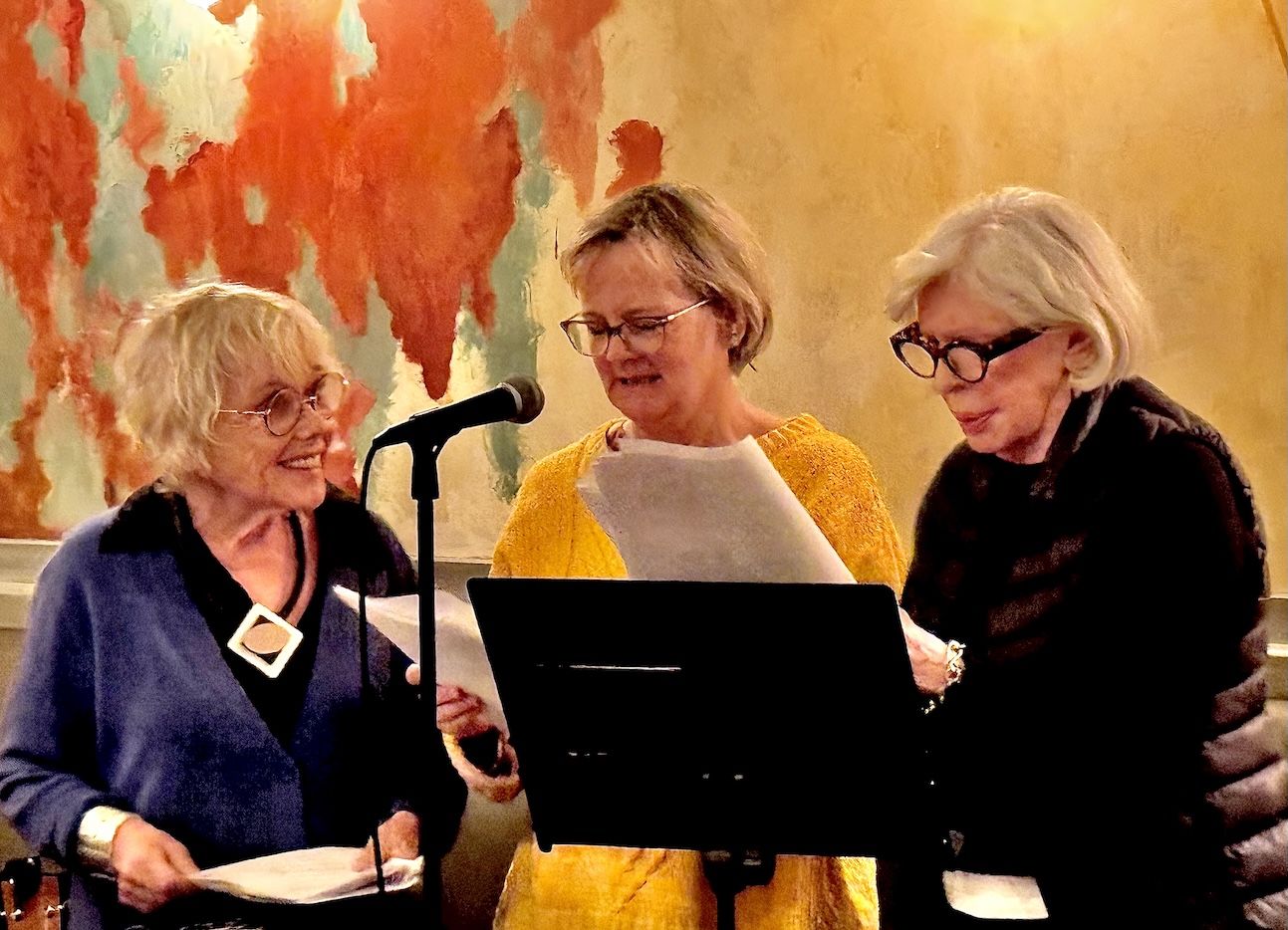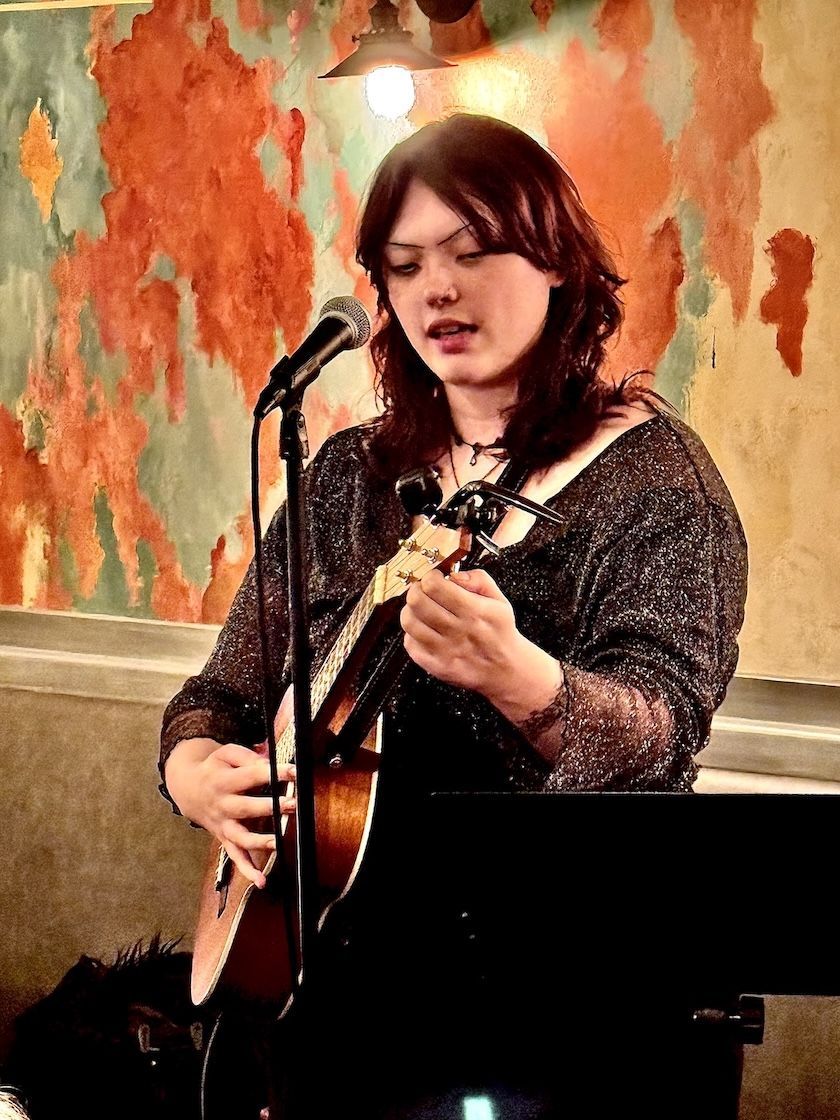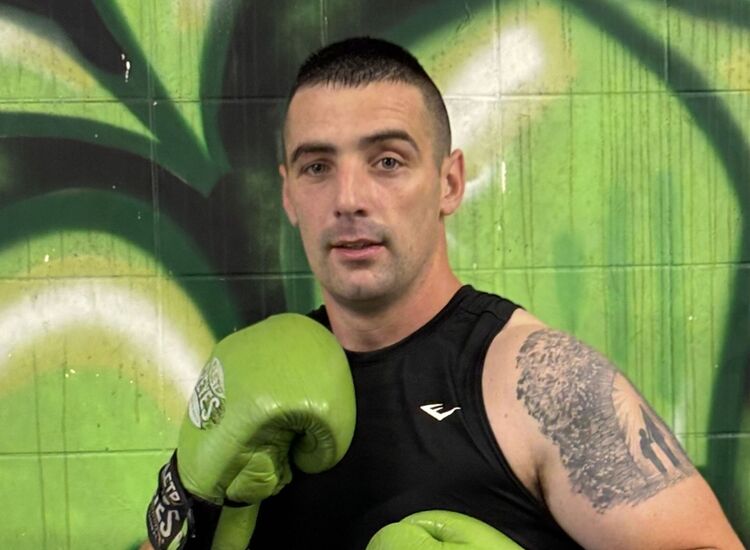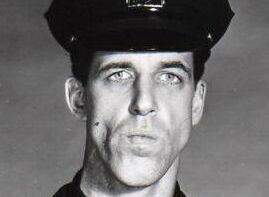On Tuesday night, Nov. 11, when autumn was finally coming into a New York view, a spirited Irish American Writers and Artists evening was coming together at the Ellington, an Upper West Side jazz bar, restaurant and lounge.
The evening’s host was Myss UneeK, a First Nation Bronx native and award-winning international slam poet who will be re-releasing her poetry collection, “Silence Broken,” on Dec. 28.
First up was Joseph A. Aquino, reading from his debut book, “Memoirs of a Watch Salesman: A New York Real Estate Story,” which chronicles his rise from Manhattan street peddler to Manhattan real estate broker. From the chapter “Traveling with Faith Consolo,” Joseph spoke of when he and Faith (his boss) were in San Diego as real estate consultants for N.Y.S. Faith said she wanted to go to Tijuana to see the new Ralph Lauren store. After persuading Faith to at least take off her high-end jewelry, they drove to the border, crossed on foot into Mexico, and were immediately greeted by bandits whom the police eventually routed. Hiring a taxi driver who had no idea what “retail” was, the duo arrived at the new Ralph Lauren store — it was small. This was succeeded by more mishaps, until finally Faith said, “Okay, let’s go back”. And the room clapped for Faith but clapped a bit longer for Joe.
Corinne O’Shaughnessy, a retired New York City public school teacher and published writer who divides her time between the Bronx and Oaxaca, Mexico, read her essay “The Zumba Hour.” The essay began with a Zumba lesson before turning to the realization of the need — not the want — to end a marriage that involved children as well. It then veered back to a Zumba class at a gym the writer had recently joined (while admitting she “is not JLo; she is Olive Oyl on crack”) and then her stretching out her “Zumba” body and “looking into a mirror, watching herself trying.” And everyone cheering her on, and on.
Next was John McDonagh, who immediately asserted: “I am responsible for getting Mamdani elected, and it all started with WBAI”. With the help of a laptop, John then streamed his proof: a podcast video he had made with Zohran Mamdani at a diner in Astoria, Queens. Topics covered were Cuomo, freezing rents, city owned grocery stores, and putting working people first. Politico ran the video; and said John proudly, “it’s been viewed over 20 million times.” And the rest is NYC mayoral history.
Then John spoke about Mamdani’s 15-day hunger strike with New York City yellow taxicab drivers, which followed the death of cab driver Kenny Chow, whose body was found in the East River in May 2018. Kenny’s death was linked to financial stress from a medallion loan, which can be as high as $1 million. John ended with his poem, “Searching for God in the Shape of a Taxi Medallion,” a bittersweet elegy for Kenny and for his wife, who had inherited the loan and died three weeks later. In the room the lights went out, then came back on.
Next was a reading of Sheila Walsh’s one-act, “Winnie and Birdie.” The cast was Marcia Loughran, Lydia Sturner and Sheila herself. The plot involved a woman with writer’s block who gets herself invited into the home of her two women neighbors. They then proceed to tell the writer all things incidental, tragic, comic or simply mundane. The writer goes home to her keyboard while her neighbors ponder whether they have given her enough “material” for her next story. It was a poker hand well played by all. Or, as the playwright said later, “maybe it was just people helping people.”

Lydia Sturner, Marcia Loughrfan, Sheila Walsh
After a brief intermission, the next presenter was 25-year-old rapper D-Why of N.O.N.C. (Now or Never Crew), a collective of four artists determined to take the music industry by storm. D-Why read in “Malachy’s Words,” a poem he had written from Malachy McCourt’s own words. From its first lines: “Resentment’s poison, dark and sly/ You drink it yourself, while you hope they die,” D-Why’s poem then gave us “A saint’s no angel, don’t be misled —/Just a sinner cut down, carefully edited,” before its last two lines: “Childhood’s laughter, myth, and play, /Keep cold regret and death away.” And the listeners applauded loudly, with more than a few suddenly hearing Malachy leading “his children” with “Wild Mountain Thyme (Will you go lassie go)” singing joyously in the room one more night.
The playwright Mark Butler then took center stage to tell us “Once upon a time there was a sweater that wanted to be like all Christmas sweaters, but this sweater was different — it was ugly!” Mark’s funny, sweet Christmas musical, “UGLY! A Christmas Sweater Story” was also in a cabaret industry showcase at the Laurie Beechman Theatre on Nov. 20 and you can see more of it at the IAW&A’s Christmas salon on Dec. 8 at the Ellington, New York City.
Thom Molyneaux, a man with half a century’s worth of experience as a playwright, director, actor, teacher and critic, presented next. Thom read from his work, Hemingway’s “Story: The Sun Also Rises.” In the first part, we meet a struggling Hemingway confessing his physical decline (and he once the big hunter!), and all the emotional wounds — some healed, some still bleeding. Of how once at an airport, he had tried to walk into a spinning propeller. Last notes for a Lost Generation that never found its way back home.
Then Thom presented Hemingway remembering a woman named Brett and a man named Romero standing in a bull ring where a bull’s hoof is keeping time. Then that Hemingway moment where a man is charging a bull and a bull is waiting, and then that man rising up and becoming one with the sky. When Thom said the last word, it was in a room where many were remembering a writer whom they wished had lingered a bit longer at “a moveable feast” with an empty chair.
The night’s last presenter was Gigi McCourt, who smiled, “yes, there is a relationship”, before dedicating the songs she would sing to the memory of her grandfather, Malachy. Only Mine and Friend of a Friend were her own original compositions and lyrics. Her third was the Cranberries’ Linger. Her sound was soft, mellow, and moody. The strings followed, and the audience kept time with a foot on the floor. Then all were smiling inside, a large burst of applause for Malachy’s granddaughter.
Next was goodbyes and hugs all around, followed by a subway turnstile three blocks south, an Uber outside, or, for those lucky few, a walk to a one-bedroom apartment under the stars on the Upper West Side.










